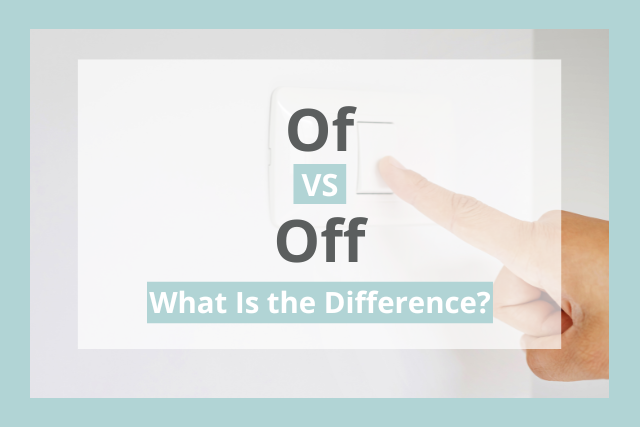
The words off and of are often confused because they look similar. But what is the difference?
Of means by, occuring in, or from when used as a preposition.
Off means in a direction away from the speaker or object when used as an adverb.
Off is also used as a preposition. It means separation from a point of attachment.
A good way to remember the difference is Turn the Freezer and Fridge OFF (there are two Fs).
The Difference Between Of vs Off
It's easy to confuse off and of because they are spelled similarly, but these words are very different.
Of is a preposition with many meanings, so we'll cover a few of them. It can mean by or relating to. It can denote a point of origin. It can also show a relationship between two words (love of dogs and men of honor).
Off can function as several parts of speech, and it has different meanings within each. As an adverb, it can mean from a place or position.
As a preposition, it can mean separation from a point of attachment (take the book off the shelf). Off can also be an adjective that means the opposite of on.
Which is right 'cut off from the' or 'cut of from the'?
You should use 'cut off from the'. These phrases are often confused because they look similar.
What's the right phrase 'off the coast of' or 'of the coast of'?
The correct phrase is 'off the coast of'. These phrases are often confused because they are easy to mistype.
Is the correct phrase 'broke off diplomatic relations' or 'broke of diplomatic relations'?
You should use 'broke off diplomatic relations'. These phrases are often confused because they appear similar.
Is the right expression 'ward off evil spirits' or 'ward of evil spirits'?
The right expression is 'ward off evil spirits'. These phrases are often confused because they appear similar.
Which is correct 'to cut off the' or 'to cut of the'?
You should use 'to cut off the'. These phrases are often confused because they look similar.
Is the correct phrase ', of course ,' or ', off course'?
The right phrase is ', of course ,'. These phrases are often confused because they are easy to mistype.
Which is right 'of the United States' or 'off the United States'?
You should use 'of the United States'. These phrases are often confused because of their similar spelling.
Is the expression 'the end of the' or 'the end off the'?
The correct expression is 'the end of the'. These phrases are often confused because they are easy to mistype.
Should it be 'at the end of' or 'at the end off'?
The right expression is 'at the end of'. These phrases are often confused because of their similar spelling.
Which is correct 'in the case of' or 'in the case off'?
The correct phrase is 'in the case of'. These phrases are often confused because they appear similar.
Some synonyms of off are: disconnected, off-duty, turned, disconnect, cancel.

